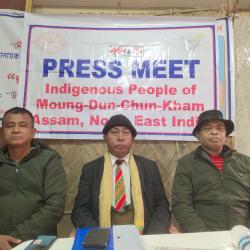Far too many years have been wasted and resources drained in heated debates and discussions, fruitless proposals and policies, discredited committees and campaigns in delivering on the vexed problems of Assam. Tearful is the story of our wary people to see the light of the day when Assam would usher in an era of all round development of all sections of the indigenous peoples. But only in a peaceful setting, we shall be poised for unbridled economic growth. Extraordinary challenges call for a dynamic leadership backed by rock –solid political and public consensus. Lasting peace can be achieved through hard–nosed negotiations, mobilizing popular opinion and rallying the masses in the supreme interest of a strong, prosperous and stable Assam. Myopic and cosmetic measures can never douse the burning issues of insurgency and illegal migration. Through this article, I have attempted to put across ‘logical, bankable and workable’ solutions to a few of the crying needs.
Militancy
Harsh counter-terror measures alone have failed in curbing militancy in the North-Eastern Region (NER). Poverty, despair, exploitation, alienation, and the loss of kin from military excesses are some of the sinister causes that militate the mind to gravitate towards militancy. Militancy offers a livelihood through power projection but ironically militants lead a sad and stressful life. The reasons are not far to seek-again alienation (from the family), despair (from living in inhospitable conditions), exploitation (by the upper echelons of the militant organisations ) etc. To wipe out the menace, we need in place a two-pronged strategy:
(A) Pell-off the foot soldiers through propaganda, social pressures, incentives, welfare programmes and placements schemes (after reverse indoctrination). Depleting numbers will eventually deprive the top brass of any outfit; the funds, the information, the public support base and other logistics; so vital for sustaining a secessionist agenda. Concomitantly, the government must foil any attempt at fresh induction by these outfits. Finally, to ensure a complete route, the diplomatic heat must be turned on the foreign patrons to sound the death knell for the beleaguered leaders safely ensconced in foreign homes.
(B) There are two ways to conduct diplomacy-direct bargaining through quid pro quo gestures with the country where elements inimical to India are holed up and implicit muscle-flexing through third-party intervention.
Let me throw some light on the latter. Let us take the case of Bangladesh, where many leaders of North-East based ultras have their hideouts. Japan is a major lender to Bangladesh and being and being a pacifist nation wary of Islamic jihad, Tokyo is tacitly supportive of the US-led global war on terror (GWOT). America has been fighting this war on three fronts – Iraq, Afghanistan and the African Maghreeb. Now the Afghan front has been extended to Pakistan. If the Hasina government starts crumbling and the jihadis stage a political come back, then the “Afpak mandate” may have to be extended to Bangladesh. It has been well-documented that terror money from one part of the globe is used to fund catastrophic events in a distant part. Even if we do not have a “Pak-like” scenario in Bangladesh, New Delhi can nudge Tokyo into reconsidering its “cheque book diplomacy” vis-à-vis Dhaka, keeping in mind the mushrooming of jihadi networks and the presence of “guest fighters” in Bangladesh: whose monetary and manpower resources can be marshaled to wage martyrdoms in the West. Japan needs no convincing that ‘terrorists don’t have a religion and a designated region for operation.’ A cautious Tokyo would then shell out funds to Dhaka with “strings attached”- that Dhaka would freeze bank accounts and businesses of terrorist outfits, dismantle their networks and nab the “Kingpins” to face prosecution.
Illegal migration
Unabated influx of illegal migrants is a painful issue, not only because of its demographic repercussions but also of its political, economic, cultural and religious ramifications on the future of the Assamese society and identity.
Let me delve on the economic aspect of this problem, as the “separatists” tend to view the “settlers” as mere economic migrants. It would be a pipedream in believing the government’s efforts to purge Assam from the “settlers”. Hence it would be imperative to hammer out a doable strategy, focused on depriving the “prospective settlers” of employment, land holding and electoral rights. This could see reverse migration or migration to pastures other than in Assam. But at the outset, there has to be a sea-change in our mindset and large scale civil society activism. The uneducated unemployed Assamese youth must not shy away from taking up jobs right from manual scavenging, to construction work to industrial labour. And employers need to reciprocate by forking out the extra buck to the native labourer who for instance, besides having to feed the family, may also have to cater to the educational needs of his children, unlike the migrant labourer who may not have obligations to his children’s education. And finally a stark reminder for all our political bigwigs- if the “settlers” outnumber the “locals” in elections, then who would lord over Dispur?
Bureaucracy
We need to encourage more and more youngsters from the state in cracking the civil services. Only when we have the numbers, we can expect our people to hold crucial portfolios in the various policy-making bodies and the corridors of power in the North and South blocks. Dispur can then press the real levers of power for leveraging favourable policy decisions towards Assam. Our crop of officers could then check any form of bias or neglects towards Assam at every level of the kafkaesque bureaucracy.
Greater electoral representation
The NER has a larger territorial area (262,230 sq kms) than UP (238,566 sq kms). Due to a smaller vote-share, this region is represented by a mere 25 MPs in a house of 543, which amounts to a negligible 4.6% representation. Therefore our voices are unheard and grievances are not addressed. Cutting across party lines, all MPs of the region must forge an impregnable alliance with like-minded MPs of other states for a long-drawn campaign to voice opposition against the existing electoral model. New Delhi must come up with a viable alternative to the present one: in which the territorial area of a region is factored in; besides the vote-share. Grievances culminate into armed rebellion. It would augur well for New Delhi to reform the electoral order; for marginalization is not an option to redress regional disparities!
- 12857 reads










Add new comment